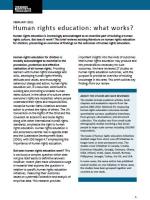
Human rights education: what works?
Human rights education is increasingly acknowledged as an essential part of building a human rights culture. But does it work? This brief reviews existing literature on human rights education for children, presenting an overview of findings on the outcomes of human rights education.
About the studies we have reviewed
The studies include academic articles, book chapters and evaluation reports from the period 2000-2020. Methods for measuring human rights education outcomes include quantitative surveys; qualitative interviews, focus groups; observations; and document collection. The studies vary from small-scale ethnographic studies involving a few dozen people to large-scale surveys including 100,000 respondents.
The types of human rights education initiatives studied range from short, one-off initiatives to longer-term or even permanent ones. The studies cover initiatives in Canada, Croatia, Dominican Republic, Georgia, Germany, Ghana, India, Ireland, Israel, Japan, Kuwait, Norway, Philippines, Senegal, Turkey, the UK, and USA.
In some cases, the same author has published several studies on one initiative; in those cases, the studies have been grouped together and counted as one study.
We strive to make the pdf versions of our publications etc. accessible for screen readers. If you experience any problems, please contact Digital Editor Stine Juhl Nielsen on stni@humanrights.dk
